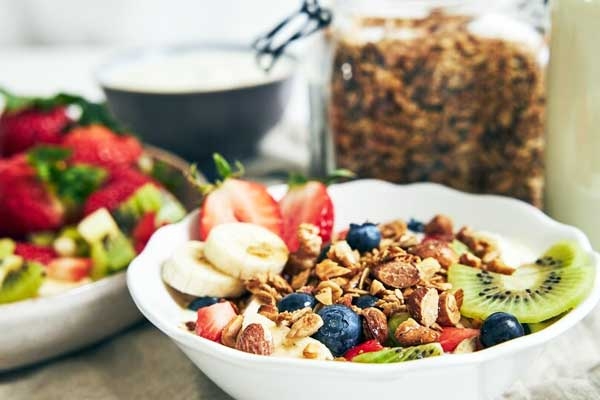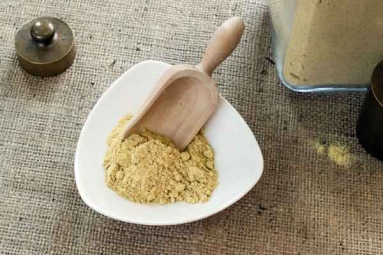
(Image source from: Freepik.com)
There's a reason why breakfast is considered the most important meal of the day. We're all guilty of skipping breakfast or eating something that isn't considered breakfast (drinking coffee isn't breakfast). However, if you want to improve your habits and start your day well, follow these 7 simple steps. Tips for preparing the perfect breakfast. Before we get into it, if you're still not convinced, here's why you shouldn't skip breakfast. A 2019 study suggests that regularly skipping breakfast may be linked to an increased risk of diseases such as obesity, high blood pressure, high cholesterol and even type 2 diabetes. All of these factors contribute to heart disease.
Here you will find instructions for a balanced diet.
1. Start with whole grains:
According to a study by Harvard University, whole grains can be very good for your health. Whole grains are made up of three parts: the bran, the germ, and the endosperm, and each part is said to contain significant amounts of health-promoting nutrients. For example, bran is a fiber-rich outer layer that helps maintain blood sugar levels. Fiber also helps prevent heart attacks and strokes. On the other hand, the bud is the nucleus of the seed in which it grows. It is rich in healthy fats, vitamin E, B vitamins, phytochemicals and antioxidants, which may help prevent some types of cancer. Examples of whole grains include oats, whole grains, millet, whole rye, oats, buckwheat, quinoa, brown rice, corn, and popcorn (specific recipes for healthy breakfast ideas are discussed later).
2. Step 2: Add protein:
Debjani Gupta, a Mumbai-based nutritionist and health expert, says protein is the building block of our body, including skin, hair, bones and muscles, and we should consume between 0.8 and 1.0 grams of protein per kilogram of body weight. Rooz says it should be secured. . Therefore, to meet your protein needs, it is important to add protein to what you have available at breakfast.
The benefits of protein include: A high-protein diet is important for muscle health, energy, strength and longevity. Protein is an essential component of the hormones and digestive enzymes produced in the body. Therefore, it is important that we all get enough protein at breakfast and other meals. A small amount of healthy fats and fiber will keep you feeling fuller for longer. A protein-rich breakfast keeps blood sugar levels low for up to 4 hours.
Here are some examples of proteins you can add to your diet.
Let's start with plant protein. Soaked, sprouted and cooked legumes overnight – green mung / kala chana / chole / mateki, vegetable protein powder (make sure to check), nuggets or soybeans, nuts and seeds. Examples of animal proteins include eggs, raw cheese, low-fat cheese and whey protein.
3. Vegetable/Fruit Brownie Points:
If you are late, you can always enjoy a variety of fruit bowls. However, ideally, you should make sure that fruits and vegetables only make up part of your breakfast and not your entire breakfast (yes, eating a piece of fruit is not breakfast). Even if it's not fruit, try adding vegetables like spinach, tomatoes, peppers and onions. These are also great options. It can be added to omelette, apama or as a side dish. If you're in a hurry, you can also drink freshly squeezed fruit or vegetable juice (be careful not to add sugar). Incorporating fruits and vegetables into your breakfast provides you with a wide range of vitamins, minerals and antioxidants that support your overall health.
4. Don't forget to add healthy fats:
Starting the day with a good source of fat instead of carbohydrates will give you sustained energy, eliminate brain fog, improve cognitive speed, and make you more productive in the morning. Plus, it's easy to add healthy fats to breakfast. Sources of healthy fats include nuts, seeds and avocados. You can also sprinkle flax seeds or chia seeds on yogurt or add avocado to a sandwich.
5. If possible, use dairy products:
There's a reason our parents made us drink a glass of milk every day. According to experts and some studies, you should definitely add milk to your breakfast (if possible, or try milk alternatives if you're vegetarian or lactose intolerant). Drinking milk suppresses hunger and improves concentration. Consuming milk regularly in the morning helps you lose weight and strengthens bones, teeth and muscles. In addition, including dairy products in the diet is associated with improved bone health, reduced risk of cardiovascular disease and type 2 diabetes, and lower blood pressure in adults. There are many ways to do this. For example, you can add dairy products such as milk, yogurt, or buttermilk, or drink a glass of milk.
6. Remember to limit your sugar consumption:
Try to avoid or limit added sugar. Instead, sweeten your breakfast with natural sweeteners such as honey or fruit.
7. Also, stay hydrated:
Don't forget to stay hydrated by drinking fresh water or herbal tea for breakfast. When the temperature rises, it is very important to stay hydrated. Severe dehydration can cause weakness, confusion and, in severe cases, death.
Here are some examples of healthy breakfast foods:
According to Gupta, here are some healthy breakfast ideas you can grab and use the next time you don't know what to make for breakfast.
Soaked nuts (some almonds, walnuts, pistachios), idli with coconut chutney or dosa and sambar vegetables.
Mix a handful of soaked nuts (some almonds, walnuts, pistachios) and dal or chili dal, dosa, idli or flat bread with chopped green leafy vegetables and green chutney.
Paneer (cheese) paratha with a handful of soaked lentils.
Poha with chopped seasonal vegetables, roasted peanuts and a handful of soaked lentils.
Millet and Dal Dosa or whole millet and Dal Upma with vegetables and a handful of soaked lentils.
Mix the chia pudding with chopped nuts and seeds as a filling. Brownie dots to add chopped seasonal fruit.
Soak oatmeal overnight by soaking rolled oats or oats with chopped nuts and seasonal fruit.
Conclusion:
Breakfast is the body's first fuel after an overnight fast, hence the name. It speeds up the metabolism and sets the tone for the whole day. So make sure your breakfast contains all the important macronutrients, such as carbohydrates, protein and healthy fats. Experiment with creative breakfast combinations to keep things interesting!









